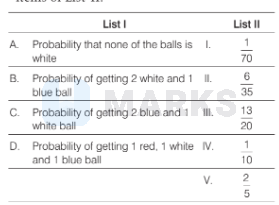Search any question & find its solution
Question:
Answered & Verified by Expert
A bag contains 6 red, 2 white and 8 blue balls. Three are drawn at random from the bag. Match the items of List-I with those items of List-II.

The correct match is
$\begin{array}{lllllllll}A & B & C & D & A & B & C & D\end{array}$
Options:

The correct match is
$\begin{array}{lllllllll}A & B & C & D & A & B & C & D\end{array}$
Solution:
2474 Upvotes
Verified Answer
The correct answer is:
III $\quad 1 \quad I N \quad$ II
Since, the bag contains 6 red, 2 white and 8 blue balls. So, probability of drawn three balls, such that none of the balls is white
$=\frac{{ }^{14} C_3}{{ }^{16} C_3}=\frac{14 \times 13 \times 12}{16 \times 15 \times 14}=\frac{13}{20}$
Probability of getting 2 white and 1 blue ball
$=\frac{{ }^2 C_2 \times{ }^8 C_1}{{ }^{16} C_3}=\frac{8 \times 3 \times 2}{16 \times 15 \times 14}=\frac{1}{70}$
Probability of getting 2 blue and 1 white ball
$\begin{aligned} & =\frac{{ }^8 C_2 \times{ }^2 C_1}{{ }^{16} C_3}=\frac{8 \times 7 \times 2 \times 3 \times 2}{2 \times 16 \times 15 \times 14} \\ & =\frac{1}{10}\end{aligned}$
Probability of getting 1 red, 1 white and 1 blue ball
$=\frac{{ }^6 C_1 \times{ }^2 C_1 \times{ }^8 C_1}{{ }^{16} C_3}=\frac{6 \times 2 \times 8 \times 3 \times 2}{16 \times 15 \times 14}=\frac{6}{35}$
So, $\mathrm{A}(\mathrm{III}), \mathrm{B}(\mathrm{I}), \mathrm{C}(\mathrm{IV})$ and $\mathrm{D}(\mathrm{II})$
Hence, option (a) is correct.
$=\frac{{ }^{14} C_3}{{ }^{16} C_3}=\frac{14 \times 13 \times 12}{16 \times 15 \times 14}=\frac{13}{20}$
Probability of getting 2 white and 1 blue ball
$=\frac{{ }^2 C_2 \times{ }^8 C_1}{{ }^{16} C_3}=\frac{8 \times 3 \times 2}{16 \times 15 \times 14}=\frac{1}{70}$
Probability of getting 2 blue and 1 white ball
$\begin{aligned} & =\frac{{ }^8 C_2 \times{ }^2 C_1}{{ }^{16} C_3}=\frac{8 \times 7 \times 2 \times 3 \times 2}{2 \times 16 \times 15 \times 14} \\ & =\frac{1}{10}\end{aligned}$
Probability of getting 1 red, 1 white and 1 blue ball
$=\frac{{ }^6 C_1 \times{ }^2 C_1 \times{ }^8 C_1}{{ }^{16} C_3}=\frac{6 \times 2 \times 8 \times 3 \times 2}{16 \times 15 \times 14}=\frac{6}{35}$
So, $\mathrm{A}(\mathrm{III}), \mathrm{B}(\mathrm{I}), \mathrm{C}(\mathrm{IV})$ and $\mathrm{D}(\mathrm{II})$
Hence, option (a) is correct.
Looking for more such questions to practice?
Download the MARKS App - The ultimate prep app for IIT JEE & NEET with chapter-wise PYQs, revision notes, formula sheets, custom tests & much more.